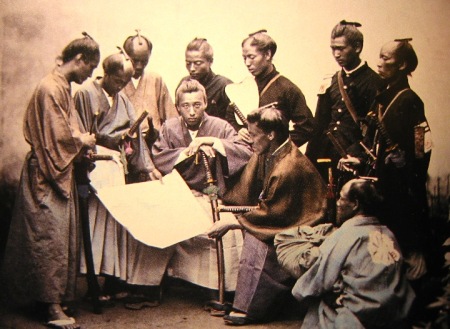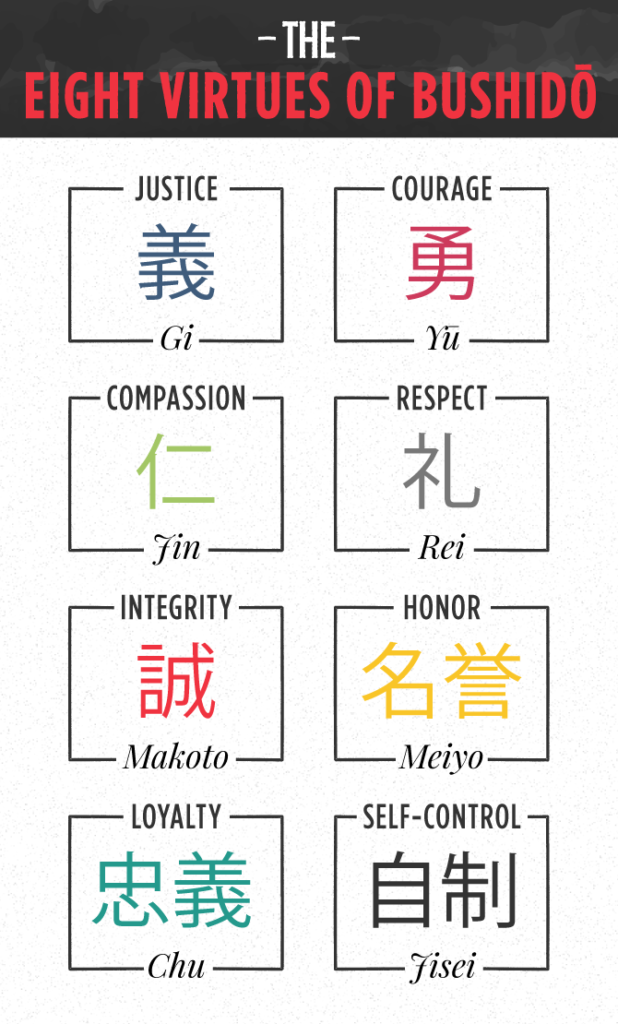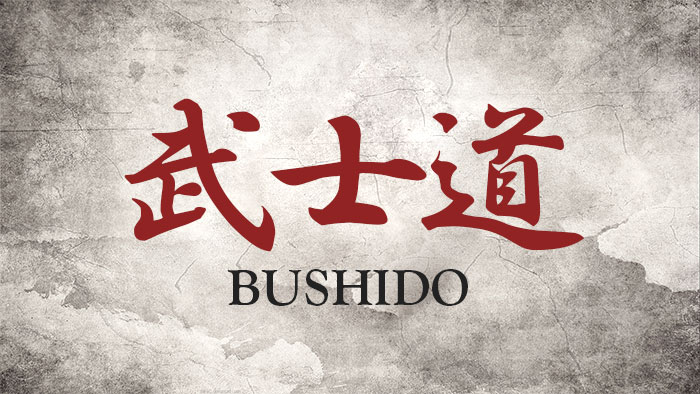by Darpan Sachdeva

The Samurai live by The Bushido Code, an absolute set of standards that they abide by—in every condition and in all circumstances.
Please allow me to note the- Bushido’s Eight Virtues as explicated by Nitobe Inazo:

1. Justice or Rectitude-
(Samurai Warrior 8 Virtues)
The samurai does what is fair. They will serve and protect their charges to the death. And will die when doing so is the just thing to do.
Rectitude or Justice, is the strongest virtue of Bushido. A well-known samurai defines it this way: ‘Rectitude is one’s power to decide upon a course of conduct in accordance with reason, without wavering; to die when to die is right, to strike when to strike is right.’
2. Courage
(Samurai Warrior 8 Virtues)
To walk into danger in honour of their commitment to excellence, boldness and service is what real warriors do. To them, sitting on the sidelines is dangerous.
Courage is worthy of being counted among virtues only if it’s exercised in the cause of Righteousness and Rectitude. In his Analects, Confucius says: ‘Perceiving what is right and doing it not reveals a lack of Courage.’ In short, ‘Courage is doing what is right.’
3. Benevolence or Mercy
(Samurai Warrior 8 Virtues)
All great leaders have the ability to show forgiveness to the enemy and sympathy to someone in need. Samurai are masters of this character gift.
A man invested with the power to command and the power to kill was expected to demonstrate equally extraordinary powers of benevolence and mercy: Love, magnanimity, affection for others, sympathy and pity, are traits of Benevolence, the highest attribute of the human soul. Both Confucius and Mencius often said the highest requirement of a ruler of men is Benevolence.
4. Politeness
To treat others with respect, keep promises and be on time is the mark of a major soldier. Being polite shows an appreciation for others. And upgrades their esteem of you.
Discerning the difference between obsequiousness and politeness can be difficult for casual visitors to Japan, but for a true man, courtesy is rooted in benevolence: Courtesy and good manners have been noticed by every foreign tourist as distinctive Japanese traits. But Politeness should be the expression of a benevolent regard for the feelings of others; it’s a poor virtue if it’s motivated only by a fear of offending good taste. In its highest form Politeness approaches love.
5. Honesty and Sincerity
The samurai are not fake. They are candid and communicate honestly. What you see is who they are. This makes them powerful, influential and hard to beat.
True samurai, according to author Nitobe, disdained money, believing that “men must grudge money, for riches hinder wisdom.” Thus children of high-ranking samurai were raised to believe that talking about money showed poor taste, and that ignorance of the value of different coins showed good breeding: Bushido encouraged thrift, not for economical reasons so much as for the exercise of abstinence.
Luxury was thought the greatest menace to manhood, and severe simplicity was required of the warrior class … the counting machine and abacus were abhorred.
6. Honour
To do what is right rather over what is easy and to follow the highest of values in the hardest of times speaks to being an honourable soul. Operating like this builds an indomitable character and confidence of steel.
Though Bushido deals with the profession of soldiering, it is equally concerned with non-martial behavior: The sense of Honor, a vivid consciousness of personal dignity and worth, characterized the samurai.
He was born and bred to value the duties and privileges of his profession. Fear of disgrace hung like a sword over the head of every samurai … To take offense at slight provocation was ridiculed as ‘short-tempered.’ As the popular adage put it: ‘True patience means bearing the unbearable.’
7. Loyalty
Warriors are loyal. To their team, to their family, to their society and to themselves.
Economic reality has dealt a blow to organizational loyalty around the world. Nonetheless, true men remain loyal to those to whom they are indebted: Loyalty to a superior was the most distinctive virtue of the feudal era. Personal fidelity exists among all sorts of men: a gang of pickpockets swears allegiance to its leader. But only in the code of chivalrous Honor does Loyalty assume paramount importance.
8. Character and Self-Discipline
Rising before the sun, training under brutal winter conditions, fiercely pushing past usual limits and being utterly strict with oneself serves soldiers well in battle. The virtue of self-discipline is one of the golden themes in every soaring life. And the Samurai exemplified it gorgeously.

Entrepreneurs may find Bushido to be particularly inspiring and worthwhile approach to life.
Bushido teaches that men should behave according to an absolute moral standard, one that transcends logic. What’s right is right, and what’s wrong is wrong.
The difference between good and bad and between right and wrong are givens, not arguments subject to discussion or justification, and a man should know the difference.
Finally, it is a man’s obligation to teach his children moral standards through the model of his own behavior:
The first objective of samurai education was to build up Character. The subtler faculties of prudence, intelligence, and dialectics were less important. Intellectual superiority was esteemed, but a samurai was essentially a man of action.
No historian would argue that Hideyoshi personified the Eight Virtues of Bushido throughout his life. Like many great men, deep faults paralleled his towering gifts. Yet by choosing compassion over confrontation, and benevolence over belligerence, he demonstrated ageless qualities of manliness. Today his lessons could not be more timely.
How are you doing when you measure your behavior against the 8 traits above? It’s worth pulling out your journal and doing a self evaluation.
 Darpan Sachdeva is the CEO and Founder of Nobelthoughts.com. With a long time passion for Entrepreneurship, Self development & Success. Darpan started his website with the intention of educating and inspiring like minded people all over the world to always strive for success no matter what their circumstances. To keep going and never get disheartened and learn from every adversity.
Darpan Sachdeva is the CEO and Founder of Nobelthoughts.com. With a long time passion for Entrepreneurship, Self development & Success. Darpan started his website with the intention of educating and inspiring like minded people all over the world to always strive for success no matter what their circumstances. To keep going and never get disheartened and learn from every adversity.


